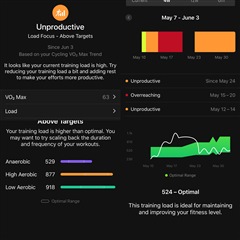Hi all,
I have an odd result on my workout/recovery screens powered by Firstbeat. I'm getting a message implying I'm working out too hard on one screen, and just barely in the "green zone" on another. I'm not really sure what to make of it. I'm using a combination of the Forerunner and an Edge using physio true up. Any thoughts or suggestions?


